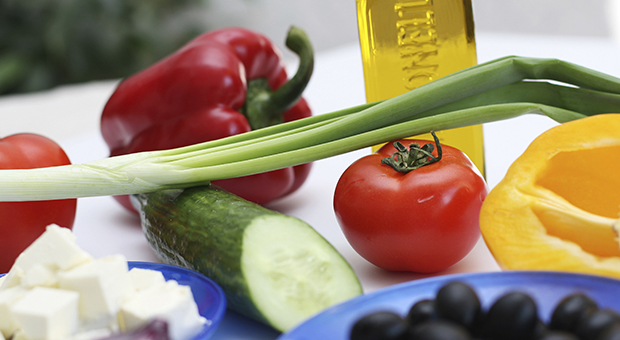The Medical Minute: How diet may influence breast health

Breast cancer is the most commonly diagnosed cancer among women in the United States. We've all heard that a healthy diet reduces the risk for breast cancer; but what does a “healthy diet” mean and why is it important?
“One of the most important cancer risk factors that women can have a direct effect on is their diet,” says Taryn Millette, a registered dietitian with Penn State Hershey Cancer Institute. “There is strong evidence that eating a healthy diet rich in vegetables, fruit, poultry, fish, and low-fat dairy products is beneficial for a variety of health reasons, including cancer risk. These foods provide a variety of nutrients that help our bodies work in the best way possible.”
Studies have shown that a Mediterranean diet—one rich in nuts, fruits, vegetables, legumes, whole grains, fish, and olive oil, with moderate amounts of red wine, which is mainly consumed during meals—protects against breast cancer through reduced oxidative stress, increased satiety, and reduced inflammation, as compared to other types of diets.
For example, women who consume a healthy diet, as characterized by vegetables, fruits and legumes; low-fat dairy products; olive and other vegetable oils; fish, organ meat and poultry; pickles; soya and whole grains, have decreased risk of breast cancer, whereas women who consume a Western diet, as characterized by sweetened drinks, tea and coffee; French fries or potato chips; salt; desserts; hydrogenated fats; refined grains and red or other processed meat, have significantly increased breast cancer risk. Some studies suggest that a Western diet increases circulating levels of reproductive hormones that may play a role in the risk for breast cancer.
“Ideally, diets should avoid refined starches and processed foods and limit ‘white' foods like sugar, white potatoes, white rice, white pasta, and refined wheat flour,” says Dr. J Stanley Smith, a breast surgeon with Penn State Hershey Breast Center. “Instead, go for color and whole foods.”
Some specific foods are gaining interest related to potential cancer-prevention. Nuts high in omega3 fatty acids, such as walnuts, may offer protection against breast cancer. Whole grains are fermented in the gut by our microbiota, producing bioactive products. Studies to understand the role of gut microbiota on breast cancer risk are currently underway. Whole grains are also rich in antioxidants, can mediate insulin and glucose responses, and may decrease circulating levels of reproductive hormones, all of which have been linked to disease prevention.
And speaking of fermentation, sauerkraut contains factors that have specific anti-cancer properties as well.
A healthy diet during adolescence may be particularly important for reducing cancer risk. This makes sense as the majority of breast development occurs during puberty. A Mediterranean diet during adolescence, such as a high-fiber diet or at least two servings of nuts per week reduces risk for breast disease. Limiting alcohol intake may be particularly important for young women, as binge drinking in early adulthood may further exacerbate risk.
So remember, eat a colorful diet, add a handful of walnuts, a serving or two of sauerkraut and keep your alcohol intake in-check and you'll be on your way improving breast health.
Just in time for Breast Cancer Awareness Month, Penn State Hershey's Pink Glove Dance Video is in the running for a $25,000 donation to the Pennsylvania Breast Cancer Coalition. Vote for Penn State Hershey every day between October 25 and November 8 at PennStateHershey.org/pinkglovedance.
Get more answers to your breast health-related questions from Penn State Hershey Breast Center experts on October 17 at 7:30 p.m. during the “Hope and Courage: A tribute to breast health” call-in show. Check our Penn State Hershey Facebook page often for your chance to submit questions prior to the show.
The Medical Minute is a weekly health news feature brought to you by Penn State Milton S. Hershey Medical Center. Articles feature the expertise of Penn State Hershey faculty physicians and staff, and are designed to offer timely, relevant health information of interest to a broad audience.
If you're having trouble accessing this content, or would like it in another format, please email Penn State Health Marketing & Communications.
